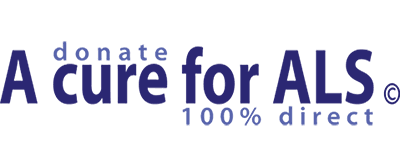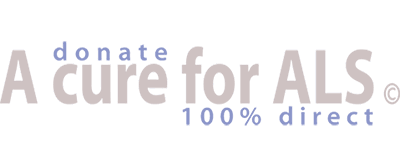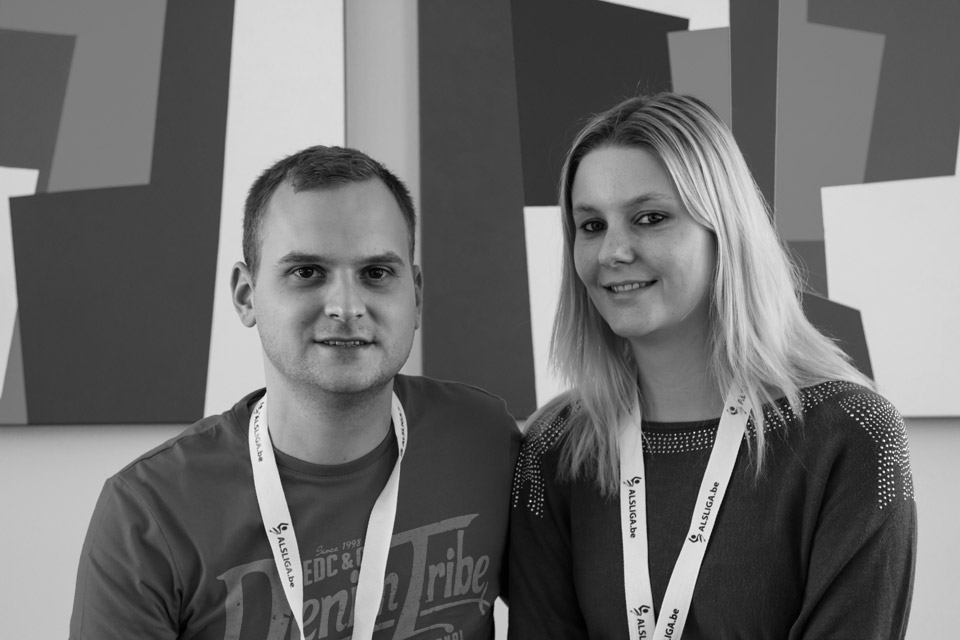Jordi Peiremans
During the ALS Liga Contact Weekend in Middelpunt in September, we interviewed some of the patients there, giving them the opportunity to tell their story. We chose to have double interviews together with their partner and/or caretaker as they are also impacted by the disease. Below you can read the story of Jordi and his wife Sophie, recently married and in their twenties. At first glance you would not even notice anything out of the ordinary.
When and how were you diagnosed with ALS?
It started about a year and a half ago with my right upper leg muscle becoming smaller in comparison with the other leg. The difference was not only visible, but I could also feel it as the muscle started to cramp and gave me pins and needles during the night. My GP then transferred me to the hospital where they examined me for nine months. Eventually I was transferred again to UZ Leuven as doctors had a suspicion that my symptoms could be ALS. In Leuven Prof. Robberecht gave me the final diagnosis. That was nine months ago.
So up until now you have not yet experienced signs of paralysis?
No, not yet. What I do notice is when I’ve had a bad night’s sleep is that it has become more difficult to get out of bed and that it takes a long time before my body functions normally again. It takes until noon before that feeling has passed.
Have your symptoms worsened since the diagnosis?
In terms of symptoms such as paralysis, no. But the fatigue is increasingly noticeable. I consider myself as a 70 year old man. I can still do everything I want, but it takes a lot of energy and I get tired easily.
What were your thoughts when you were first diagnosed with ALS? Were you familiar with the disease?
No, I didn’t really know ALS. When they told me Stephen Hawking has the disease, I kind of knew what it was, but didn’t realise the disease is life-threatening as Stephen Hawking has been living with the disease for such a long time. Eventually I found out on Wikipedia that ALS is actually life-threatening. That was a big shock.
What do you experience as the most bothersome of the disease ALS?
Over the last nine months I have accepted that I will become paralysed at some point, become wheelchair bound, but I still believed my life expectancy would remain the same. The ALS diagnosis has had such a big impact on me because the disease is so life-threatening. Death is the ultimate unknown and thinking about leaving this life, dying, are things I reflect upon. To an extent it also scares me and that is one of the most difficult aspects of ALS. When you aren’t ill, it isn’t exactly what you think about on daily basis. That overthinking is really something that has been bothering me which is why I started to see a psychologist to help me manage my thoughts. I want to learn how to live with ALS as comfortably as possible.
What has changed since the ALS diagnosis in terms of life, job and hobbies?
I have an admin job so the impact has been minimal, but I already started to work parttime as I need more sleep than I used to. Also the diagnosis and the doom scenarios surrounding ALS are always on my mind. Day in, day out. Mentally that is quite challenging. This is enhanced by the uncertainty of how the disease will develop and how and where symptoms will start to appear. Each day I have to put things in perspective. Your life changes, you start to live more intensely. Things you would have liked to do in the future, such as embarking on a big trip, no longer interest me. Now I just want to enjoy being with my wife, I do not need to know how it feels to do a bungee jump. There are other life goals to be achieved. When you are not ill, you think certain things are important, but when you are ill, you realise what matters. I had just started to cycle quite regularly which is how the change in my right leg muscle became noticeable. Now the question is whether I can do any sports at all and if I do, to what extent. Will it impact the disease progression for example. This is why I limit my cycles now. Some people here have told me that I need to take it up again, that there is no need to be scared, also because of the mental benefits you experience when you keep doing sports.
Have you been married long?
We have been married for six months now. We had plans to get married some day, but the disease made everything happen faster. A week before the diagnosis I asked Sophie to marry me as we both had an idea what was coming.
Do you value the contact with other ALS patients?
Yes, I do actually. We have met a couple of peope here who have been living with the disease for over 20 years. This gives us hope of the possibility that I could have the slow form of ALS. At the start, right after the diagnosis, I had to look at the statistics who gave me only a small chance of having this form, but now I have to admit that we have increasingly more hope. I also wanted to come here to see for myself and to hear others share their experiences. You can find a lot of information on the internet, but not everything is trustworthy or correct.
How did you get in touch with the ALS Liga?
Thanks to my wife’s research. At the time I did not want to meet other patients and we had an appointment in Leuven with Mia. Suddenly Danny entered the room… That meeting gave me a real boost. With people such as Danny and Timmy you really see that their mind is stronger than their body. That gives me courage as the mental aspect is very important. You can ask Danny the most random questions and he will give you a straightforward answer. That gives me the feeling that I do not have to worry, that there is solution for everything. Now I know I can handle meeting other patients, the ice has been broken and we now feel ready to participate in other activities supporting the ALS liga. I also wanted to meet Timmy and Rosita after seeing them on TV which was quite a shock. Now that we have met them in person, our views have changed, giving us a better feeling. They have been giving us a lot of advice on whatever is on our mind based on their own experience which is really useful for us. It can be advice on small things, but also advice on child related matters as they have a daughter Myrthe. Maybe in the future I can see myself getting more involved with the ALS Liga, depending on how my disease will progress. I would like to be a point of contact for people who have recently been diagnosed, really guide them as that is something we missed before getting in touch with the ALS Liga. And that guidance is really necessary. If I would be able to somehow be involved, that would be great.
Would you consider booking a short stay in Middelpunt?
In the long term it could definitely be an option, when I would be in a wheelchair and it becomes a necessity.
How do you see the future?
I look at the future positively, but not without a lot of questions. When I come here for example and people tell me it appears my disease develops slowly. I do not want to put all my hope on the slow form of ALS, but there is hope. Also us being married gives me hope, a demonstration of our love. We would also like to have children, preferably as soon as possible to make as much time for them as possible. Everything is happening so fast now. For example, buying a house. And we also think ahead when buying a new car.
How important is family for you?
Our family has been incredibly supportive. In addition we are both getting a lot of support from our colleagues at work. Fortunately we do not feel pressured or overprotected by our parents. They let us live our own life, but are always there for us when we ask for help. Our future children are also already important to us. We really spend a lot of time thinking about them, especially in terms of how to organise things in combination with ALS. Children often understand these things easily but we do want to be as open as we can about it.
Translation: Lynn Osten
Source: Nieuwsbrief 162 – October, November, December 2013



